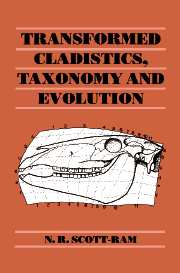Book contents
- Frontmatter
- Contents
- Preface
- Introduction
- PART I ISSUES PERTAINING TO THE PHILOSOPHY OF SCIENCE
- PART II THE STATUS OF THEORETICAL CLASSIFICATIONS
- 2 Evolutionary systematics and theoretical information
- 3 Phylogenetic cladistics and theoretical information
- PART III THE STATUS OF DESCRIPTIVE CLASSIFICATIONS
- Notes
- Bibliography
- Author index
- Subject index
2 - Evolutionary systematics and theoretical information
Published online by Cambridge University Press: 21 October 2009
- Frontmatter
- Contents
- Preface
- Introduction
- PART I ISSUES PERTAINING TO THE PHILOSOPHY OF SCIENCE
- PART II THE STATUS OF THEORETICAL CLASSIFICATIONS
- 2 Evolutionary systematics and theoretical information
- 3 Phylogenetic cladistics and theoretical information
- PART III THE STATUS OF DESCRIPTIVE CLASSIFICATIONS
- Notes
- Bibliography
- Author index
- Subject index
Summary
Introduction
The main issue to be confronted in this and the following chapter is how much theoretical information classifications can carry in practice. As we have seen, to talk of classifications as either theories or descriptions alone can be construed as a shorthand for the conveyancing of information in classifications, and that this sense must not be confused with an alternative, in which the predicates in a classification convey theoretical import or are purely descriptive terms. Both evolutionary systematists and phylogenetic cladists make a point of arguing that their respective classifications store the greatest amount of theoretical information. This claim will be examined in detail with a view to clarifying the prejudice that the more information that is fed into a classification, the more likely a correct explanation will be uncovered. The reasons for the failure of this prejudice will be discussed and it will be argued that the aims as set out, especially in Mayr and Hennig, are not concordant with the methods. Indeed, some of the aims do not appear to be very sensible.
My discussion will be structured in terms of giving an account of:
the purposes of biological classification;
the manner in which each of the above systems (i.e. Mayr, Simpson in this chapter and Hennig in Chapter 3), attempt to fulfill that purpose;
and whether or not these methods accomplish the purpose for which they are intended.
Before examining these issues, a short account of evolutionary systematics is necessary.
- Type
- Chapter
- Information
- Transformed Cladistics, Taxonomy and Evolution , pp. 41 - 65Publisher: Cambridge University PressPrint publication year: 1990



